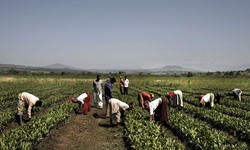
Palm oil risk to Africa as prospectors eye swaths of land
by Josephine Moulds
Palm oil has long been produced in Africa on small-scale, diversified plantations. A report on palm oil, published last year by the NGO Grain, notes that tens of millions of people in Africa, most of them women, rely on this native tree for food and livelihoods. But the landscape is changing.
Booming global demand for palm oil and limited room for the industry’s expansion in Asia have led large palm oil producers to look towards Africa. Companies are also betting on an explosion in demand from the European Union for palm oil as a sustainable fuel, and Africa is the closest palm oil-producing region.
These producers are being welcomed into Africa with open arms. Governments desperate for foreign investment are scrambling to sign deals, offering companies cheap land and tax holidays in the hope of generating jobs and development.
Politicians are struggling with the supposed trade-off between growth and conservation. Liberia’s finance minister, Amara Konneh, has said the country is “worried about the ecological consequences, but we have to grow the economy. We have to create jobs for our own people. How we do it sustainably is where we are struggling.”
Swaths of land have been allocated to foreign companies for oil palm plantations. Grain lists 66 deals (pdf) covering nearly 4m hectares over the past decade and a half.
Nigeria was already the fourth biggest producer of palm oil last year, according to the US Food and Agriculture Organisation. With total production of 960,000 tonnes of the oil it still ranks far behind Indonesia, the largest producer at 28.4m tonnes, but that figure will shoot up when new plantations start production.
Much of the land in African countries is owned by the state, so governments are handing vast areas to companies with no compensation to people living and working on it. Winnie Overbeek, international coordinator of the World Rainforest Movement, says: “Sometimes there is compensation for the crops they have lost, but never for the land. Normally the communities have the right to use the land but they are not the owners.”
The risks involved in transferring the land to large monoculture plantations are significant. While some jobs are created on the new plantations, Overbeek says palm oil production requires fewer workers than if the land were used for traditional small-scale palm oil businesses and growing food.
By transferring the land to the exclusive propagation of oil palm, he says, areas are losing the ability to grow food for themselves.
The plantations are causing large-scale deforestation and affecting the water supplies. “Oil palm needs water but it doesn’t need too much, so when you have areas with a lot of water, with biodiversity and people who use it for washing and drinking, you need to drain that area,” Overbeek adds. Water supplies are also being contaminated by pesticides used on the oil palm plantations.
The activities of US-based Herakles Capital in Cameroon provide a stark example of the dangers of the new wave of land acquisitions in Africa, and the growing opposition they face. In 2009, the Cameroon government signed a deal with the company to clear approximately 70,000 hectares in the south west, the majority of it forest. The Oakland Institute and Greenpeace published a report on the project which found it will have a detrimental impact on the local environment, remove land and livelihoods from thousands of people, and bring little economic return for the country and its people.
The project has since faced major opposition from the communities living on the land and Herakles has agreed to scale down its plantation. NGOs campaigning on this issue have been accused of standing in the way of development in Africa. They argue that they are not against increasing palm oil production in Africa, merely that it just needs to be achieved more sustainably.
Simon Counsell, executive director of Rainforest Foundation UK, says his organisation is exploring integrating smaller-scale production into a “pattern of local community tenure and ownership in a way that helps to secure the land for those communities, as well as gives them an income and employment opportunity”.
This approach would involve technical developments to make smaller palm mills and better planning of transport and distribution networks.
Counsell says: “If that is done, there is the possibility to increase palm oil production without causing the environmental damage that we’ve seen in Borneo, while bringing much needed developmental improvements to the communities in those regions.”












